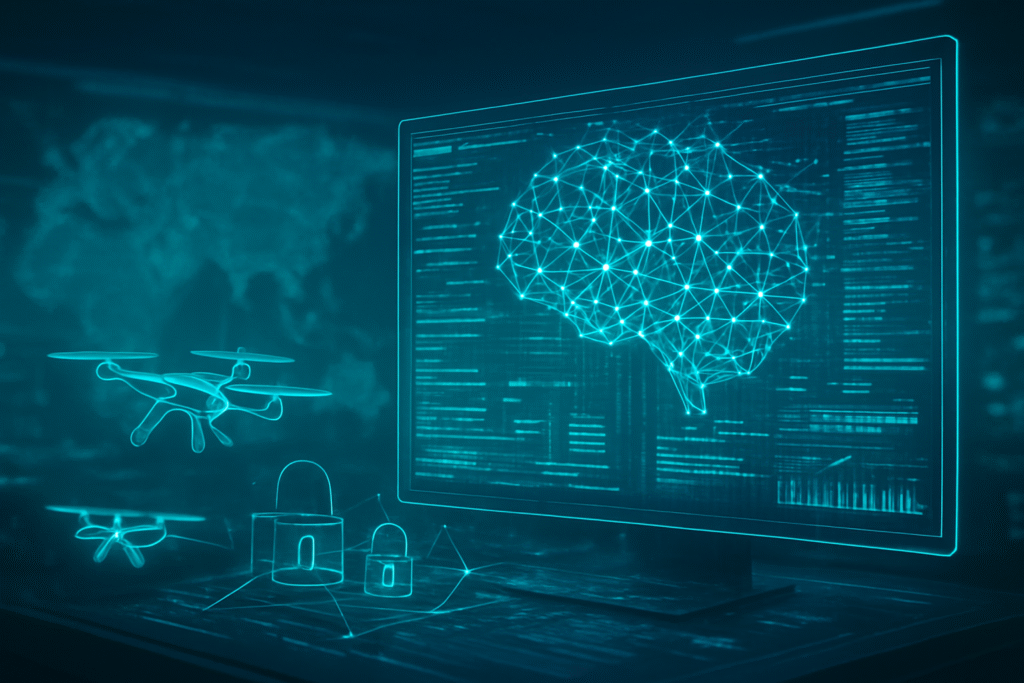
Denver, CO – November 3, 2025 – Palantir Technologies (NYSE: PLTR) is once again at the epicenter of the artificial intelligence revolution, with its highly anticipated Q3 2025 earnings report, released today, confirming its pivotal role in the booming AI defense technology sector. While the full financial details are still being digested by the market, preliminary indications and strong analyst expectations point to another quarter of robust growth, primarily driven by the company's Artificial Intelligence Platform (AIP) and a surge in government and commercial contracts. This performance is not only solidifying Palantir's market position but also igniting a broader rally across AI defense tech stocks, signaling a profound and lasting transformation in national security and enterprise operations.
The market's enthusiasm for Palantir's trajectory is palpable, with the stock demonstrating significant momentum leading into the earnings call. This optimism is reflective of a wider trend where AI-powered defense solutions are becoming indispensable, prompting increased investment and strategic partnerships across the globe. As nations grapple with escalating geopolitical tensions and the imperatives of modern warfare, companies at the forefront of AI integration are experiencing unprecedented demand, positioning them as critical players in the evolving global landscape.
Palantir's AI Engine Drives Expected Record Performance
Palantir's Q3 2025 earnings report was met with intense scrutiny, particularly concerning the performance of its Artificial Intelligence Platform (AIP). Analysts had set high expectations, projecting revenue to reach approximately $1.09 billion, representing a year-over-year increase of over 50%. This figure would mark Palantir's highest sequential quarterly growth, building on its Q2 2025 achievement of surpassing $1 billion in quarterly revenue for the first time. Adjusted earnings per share (EPS) were anticipated to hit $0.17, a substantial 70% increase from the prior year's third quarter, showcasing the company's accelerating profitability.
The core of this anticipated success lies in Palantir's AIP, launched in April 2023. This platform has been instrumental in driving an explosive acceleration in commercial revenue, particularly in the U.S., where Q2 2025 saw a remarkable 93% year-over-year surge. AIP is designed to enable organizations to securely deploy and manage large language models (LLMs) and other AI technologies, converting raw data into actionable intelligence. This differs significantly from traditional data analytics platforms by offering an integrated, end-to-end AI operating system that accelerates customer conversions through its unique "bootcamp" model, providing rapid AI insights and practical applications across diverse sectors. Initial reactions from the AI research community and industry experts highlight AIP's effectiveness in bridging the gap between cutting-edge AI models and real-world operational challenges, particularly in sensitive defense and intelligence environments.
Palantir's government sector continued its dominance, with U.S. government revenue accounting for nearly 80% of total government revenue. A landmark $10 billion, 10-year contract with the U.S. Army in August 2025 underscored this strength, consolidating numerous individual contracts into a single enterprise agreement. Strategic partnerships with Boeing (NYSE: BA) for its defense and space division and Nvidia (NASDAQ: NVDA) to integrate its chips and software further validate Palantir's evolution into a mainstream AI operating system provider. These collaborations, coupled with new defense-related agreements with the UK and Polish governments and an extended commercial collaboration with Lumen Technologies (NYSE: LUMN), demonstrate Palantir's strategic vision to embed its AI capabilities across critical global infrastructure, cementing its role as an indispensable AI partner for both public and private entities.
Reshaping the AI Competitive Landscape
Palantir's anticipated Q3 2025 performance and the broader AI defense tech rally are significantly reshaping the competitive landscape for AI companies, tech giants, and startups alike. Companies like Palantir, with their agile, AI-first, software-driven approach, stand to benefit immensely, securing large, long-term contracts that solidify their market positioning. The $10 billion U.S. Army contract and the £1.5 billion UK defense deal are prime examples, positioning Palantir as a de facto standard for allied AI-driven defense infrastructure. Wedbush analysts even project Palantir could achieve a trillion-dollar market capitalization within two to three years, driven by its expanding AI business.
This surge creates competitive pressures for traditional defense contractors such as Lockheed Martin (NYSE: LMT), RTX Corporation (NYSE: RTX), Northrop Grumman (NYSE: NOC), and Leidos Holdings (NYSE: LDOS). While these incumbents are integrating AI, Palantir's rapid deployment capabilities and software-centric focus challenge their more hardware-heavy models. However, some traditional players like RTX Corporation reported strong Q3 2025 earnings, with its Raytheon segment seeing a 10% sales increase driven by demand for Patriot air defense systems, indicating a mixed landscape where both new and old players are adapting. Tech giants like Microsoft (NASDAQ: MSFT) with Azure OpenAI and Amazon Web Services (AWS) with SageMaker and Bedrock are both competitors and collaborators, leveraging their vast cloud infrastructures and AI research to offer solutions. Microsoft, for instance, secured a $48 million Defense Department contract for its NorthPole AI chip. Oracle (NYSE: ORCL) has even launched a Defense Ecosystem providing federal agencies access to Palantir's AI tools via Oracle Cloud Infrastructure (OCI), highlighting a dynamic environment of both rivalry and strategic alliances.
The rally also creates a fertile ground for AI defense startups, which are increasingly seen as disruptors. Companies like Anduril Industries, valued at over $20 billion, and Shield AI, with a $2.8 billion valuation, are frontrunners in AI-enabled defense systems, autonomous weapons, and drone manufacturing. Rebellion Defense, a unicorn startup, develops AI software for military threat detection, supporting initiatives like the U.S. Navy's Project Overmatch. Even companies like Archer Aviation (NYSE: ACHR), initially in urban air mobility, have pivoted to defense through Archer Defense, partnering with Anduril. This "militarization of Silicon Valley" signifies a shift where agility, specialized AI expertise, and rapid innovation from startups are challenging the dominance of established players, fostering a vibrant yet intensely competitive ecosystem.
AI's Growing Footprint in a Volatile World
The wider significance of Palantir's anticipated strong Q3 2025 earnings and the AI defense tech rally cannot be overstated. This trend is unfolding within a broader "AI spring," characterized by accelerated growth in AI driven by advancements in generative AI and scientific breakthroughs. Geopolitically, early November 2025 is marked by heightened global instability, with 56 active conflicts—the highest number since World War II. This environment of persistent conflict is a primary catalyst for increased military spending and a heightened focus on AI defense. AI is now transforming from a theoretical concept to a frontline military necessity, enabling data-driven decisions, complex intelligence analysis, optimized logistics, and advanced battlefield operations.
The impacts are profound: enhanced military capabilities through improved decision-making and intelligence gathering, a reshaping of the military-industrial complex with a shift towards software and autonomous systems, and significant economic growth in the defense tech sector. The global AI market in aerospace and defense is projected to expand significantly, reaching $65 billion by 2034. However, this rapid integration of AI in defense also raises serious concerns. Ethical dilemmas surrounding lethal autonomous weapons systems (LAWS) capable of making life-or-death decisions without human intervention are paramount. There's a recognized lack of official governance and international standards for military AI, leading to complex questions of accountability and potential for bias in AI systems. The risk of an uncontrolled "AI arms race" is a looming threat, alongside cybersecurity vulnerabilities and the dual-use nature of many AI technologies, which blurs the lines between civilian and military applications.
Compared to previous AI milestones, this "AI spring" is distinguished by the real-world operationalization of AI in high-stakes defense environments, driven by breakthroughs in deep learning and generative AI. Unlike the dot-com bubble, today's AI rally is largely led by established, profitable companies, though high valuations still warrant caution. This current defense tech boom is arguably the most significant transformation in defense technology since the advent of nuclear weapons, emphasizing software, data, and autonomous systems over traditional hardware procurements, and enjoying consistent bipartisan support and substantial funding.
The Horizon: Autonomous Systems and Ethical Imperatives
Looking ahead, both Palantir and the broader AI defense technology sector are poised for transformative developments. In the near-term (1-2 years), Palantir is expected to further solidify its government sector dominance through its U.S. Army contract and expand internationally with partnerships in the UK and Poland, leveraging NATO's adoption of its AI-enabled military system. Its AIP will continue to be a core growth driver, particularly in the commercial sector. Long-term (3-5+ years), Palantir aims to become the "default operating system across the US" for data mining and analytics, with some analysts optimistically predicting a $1 trillion market capitalization by 2027.
For the wider AI defense sector, the global market is projected to nearly double to $19.29 billion by 2030. Near-term advancements will focus on AI, autonomous systems, and cybersecurity to enhance battlefield operations and threat detection. Longer-term, breakthroughs in quantum technology and advanced robotics are expected to redefine military capabilities. Potential applications on the horizon include fully autonomous combat systems within 6-8 years, enhanced real-time intelligence and surveillance, advanced cyber defense with agentic AI systems, predictive maintenance, and AI-powered decision support systems. AI will also revolutionize realistic training simulations and enable sophisticated electronic and swarm warfare tactics.
However, significant challenges remain. The ethical, legal, and political questions surrounding autonomous weapons and accountability are paramount, with a recognized lack of universal agreements to regulate military AI. Data quality and management, technical integration with legacy systems, and building human-machine trust are critical operational hurdles. Cybersecurity risks and a global talent shortage in STEM fields further complicate the landscape. Experts predict that AI will profoundly transform warfare over the next two decades, with global power balances shifting towards those who most effectively wield AI. There's an urgent need for robust governance and public debate on the ethical use of AI in defense to manage the serious risks of misuse and unintended harm in an accelerating AI arms race.
A New Era of AI-Powered Defense
In summary, Palantir's anticipated strong Q3 2025 earnings and the vibrant AI defense tech rally signify a pivotal moment in AI history. The company's Artificial Intelligence Platform (AIP) is proving to be a powerful catalyst, driving explosive growth in both government and commercial sectors and validating the tangible benefits of applied AI in complex, high-stakes environments. This success is not merely a financial triumph for Palantir but a testament to the broader "democratization of AI," making advanced data analytics accessible and operational for a wider range of organizations.
The long-term impact promises a future where AI is not just a tool but an integral operating system for critical infrastructure and strategic initiatives, potentially reshaping geopolitical landscapes through advanced defense capabilities. The emphasis on "software that dominates" points to a foundational shift in how national security and enterprise strategies are conceived and executed. However, the current high valuations across the sector, including Palantir, underscore the market's elevated expectations for sustained growth and flawless execution.
In the coming weeks and months, industry observers should closely monitor Palantir's continued U.S. commercial revenue growth driven by AIP adoption, its international expansion efforts, and its ability to manage increasing expenses while maintaining profitability. The broader competitive dynamics, particularly with other data analytics and cloud warehousing players, will also be crucial. Furthermore, sustained trends in AI investment across enterprise and government sectors, alongside defense budget allocations for AI and autonomy, will continue to shape the trajectory of Palantir and the wider AI defense technology market. This era marks a profound leap forward, where AI is not just augmenting human capabilities but fundamentally redefining the architecture of power and progress.
This content is intended for informational purposes only and represents analysis of current AI developments.
TokenRing AI delivers enterprise-grade solutions for multi-agent AI workflow orchestration, AI-powered development tools, and seamless remote collaboration platforms.
For more information, visit https://www.tokenring.ai/.




